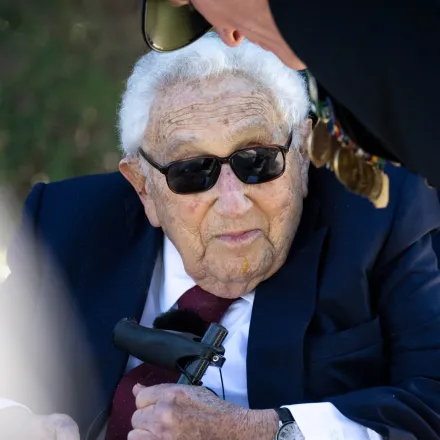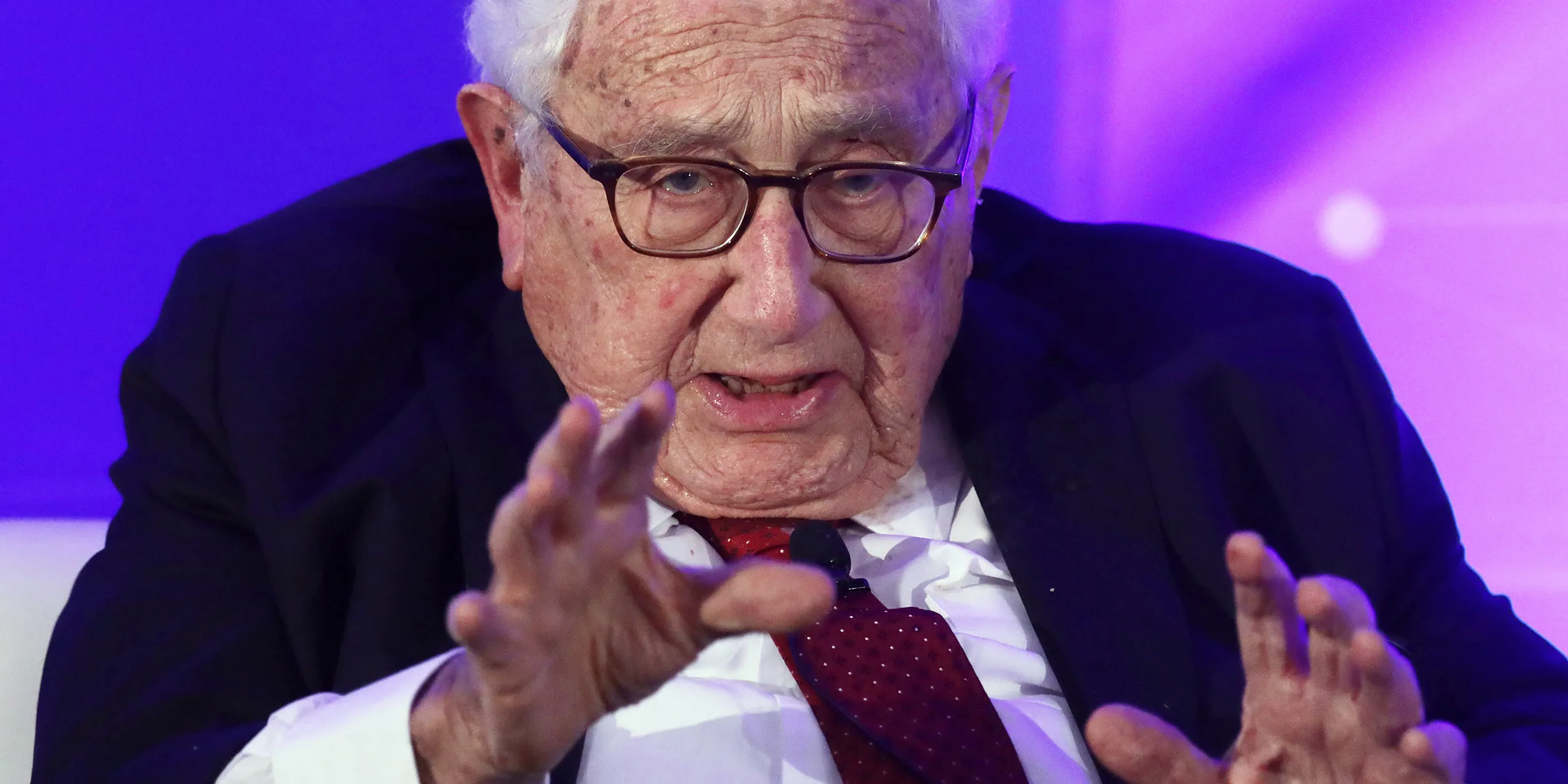
Henry Kissinger, regarded as the United States most influential diplomat and national security advisor, was awarded the Presidential Medal of Freedom – America’s highest civilian award – in 1977.
In 1982, he founded Kissinger Associates, an international consulting group that became a revolving door refuge for top national security officials looking to cash in on their government service. The firm leveraged their and Kissinger’s reputations and contacts to help huge multinational corporations, banks, and financial institutions – including American Express, Anheuser-Busch, Coca-Cola, Heinz, Fiat, Volvo, Ericsson, and Daewoo – broker deals with governments.
“A big part of Henry Kissinger’s legacy is the corruption of American foreign policymaking,” Matt Duss, a former adviser to Sen Bernie Sanders, told Vox in 2023. “It is blurring the line, if not outright erasing the line, between the making of foreign policy and corporate interests.”
Kissinger counselled every US president from Nixon through Donald Trump and served as a member of the President’s Foreign Intelligence Advisory Board from 1984 to 1990 and the Pentagon’s Defence Policy Board from 2001 to 2016. After being tapped to head the 9/11 Commission, families of victims raised questions about potential conflicts of interest due to Kissinger’s financial ties with governments that could be implicated in the commission’s work. Kissinger quit rather than hand over a list of his consultancy’s clients.
In his 2001 book-length indictment, The Trial of Henry Kissinger, Christopher Hitchens called for Kissinger’s prosecution “for war crimes, for crimes against humanity and for offenses against common or customary or international law, including conspiracy to commit murder, kidnap and torture” from Argentina, Bangladesh, Chile and East Timor to Cambodia, Laos, Uruguay, and Vietnam.
Kissinger ducked questions about the bombing of Cambodia, muddied the truth in public comments, and spent half his life lying about his role in the killings there. In the early 2000s, Kissinger was sought for questioning in connection with human rights abuses by former South American military dictatorships, but he evaded investigators, once declining to appear before a court in France and bolting from Paris after receiving a summons. He was never charged or prosecuted for deaths for which he bore responsibility.
“Much of the world considered Kissinger to be a war criminal, but who would have dared put the handcuffs on an American secretary of state?” asked Brody, who brought historic legal cases against Pinochet, Chadian dictator Hissène Habré, and others. “Kissinger was not once even questioned by a court about any of his alleged crimes, much less prosecuted.”
Kissinger continued to win coveted awards and hobnobbed with the rich and famous at black-tie White House dinners, Hamptons galas and other invitation-only events. By the 2010s, the Republican diplomat had become a darling of mainstream Democrats and remained so until his death. Hillary Clinton called Kissinger “a friend” and said she “relied on his counsel” while serving as secretary of state under President Barack Obama.
Samantha Power, who built her reputation and career on human rights advocacy and went on to serve as the Obama administration’s ambassador to the UN and the Biden administration’s head of the US Agency for International Development, befriended Kissinger before receiving the American Academy of Berlin’s Henry A. Kissinger Prize from Kissinger himself. Biden’s secretary of state, Antony Blinken, also had a long, cordial relationship with his distant predecessor.
Kissinger was repeatedly feted for his 100th birthday in May 2023. A black-tie gala at the New York Public Library was attended by Blinken; Power; Biden’s CIA director, William J. Burns; disgraced former CIA director and four-star Gen David Petraeus; fashion designer Diane von Furstenberg; New England Patriots owner Robert Kraft; former New York City Mayor Mike Bloomberg; former Google CEO Eric Schmidt; and the Catholic Archbishop of New York Timothy M. Dolan, among other luminaries.
To mark Kissinger’s centenary, Koppel, who became Kissinger’s friend following the 1974 documentary, conducted a sympathetic interview for CBS News that nonetheless broached the charges that dogged Kissinger for decades. “There are people at our broadcast who are questioning the legitimacy of even doing an interview with you. They feel that strongly about what they consider, I’ll put it in language they would use, your criminality,” said Koppel.
“That’s a reflection of their ignorance,” Kissinger replied.
When Koppel brought up the bombing of Cambodia, Kissinger got angry. “Come on. We have been bombing with drones and all kinds of weapons every guerilla unit that we were opposing,” he shot back. “It’s been the same in every administration that I’ve been part of.”
“The consequences in Cambodia were particularly…”
“Come on now.”
“No, no, no, were particularly…”
“This is a programme you’re doing because I’m gonna be 100 years old,” Kissinger growled. “And you’re picking a topic of something that happened 60 years ago. You have to know that it was a necessary step. Now, the younger generation feels that if they can raise their emotions, they don’t have to think. If they think, they won’t ask that question.”
When The Intercept asked that question about Cambodia – in a more pointed manner – 13 years earlier, Kissinger offered the same dismissive retorts and flashed the same fury. “Oh, come on!” he exclaimed. “What are you trying to prove?” Pressed on the mass deaths of Cambodians resulting from his policies, the senior statesman long praised for his charm, intellect, and erudition told this reporter to “play with it.”
“The covert justifications for illegally bombing Cambodia became the framework for the justifications of drone strikes and forever war.”
Kissinger’s legacy extends beyond the corpses, trauma, and suffering of the victims he left behind. His policies, Grandin told The Intercept, set the stage for the civilian carnage of the US war on terror from Afghanistan to Iraq, Syria to Somalia and beyond. “You can trace a line from the bombing of Cambodia to the present,” said Grandin, author of “Kissinger’s Shadow.” “The covert justifications for illegally bombing Cambodia became the framework for the justifications of drone strikes and forever war. It’s a perfect expression of American militarism’s unbroken circle.”
Brody, the war crimes prosecutor, says that even with Kissinger’s death, some measure of justice is still possible.
“It’s too late, of course, to put Kissinger in the dock now, but we can still have a reckoning [with] his role in atrocities abroad,” Brody told The Intercept. “Indeed, his death ought to trigger a full airing of US support for abuses around the world during the Cold War and since, maybe even a truth commission, to establish an historical record, promote a measure of accountability, and if the United States were ready to apologize or acknowledge our misdeeds – as we have done in places like Guatemala and Iran – to foster a kind of reconciliation with the countries whose people suffered the abuses.”
- The Intercept report











